I bet you’ve done it.
Seen a blog post that received thousands of shares, and thought:
“One day, that will be me.”
Or more likely, “Boy, I wish that could be me.”
But what’s the secret behind those super popular posts? What’s the writer doing that you’re not?
After all, your content is just as good or better, but your results are embarrassing in comparison.
You just can’t seem to figure out the whole “viral” thing.
Here’s the part you’re missing:
Certain types of content are more likely to be shared than others.
Sure, quality is important. But some posts have shareability in their DNA.
And one type in particular is almost guaranteed to catch fire on social media…
The expert roundup.
Case Study: The Incredible Power of an Expert Roundup Post
A few years ago, I published this roundup asking bloggers their best tip for promoting blog content.
Over 40 different experts gave their views on the topic, and the resulting post quickly became my most successful ever:
- It attracted over 4,000 social shares and remains the most shared post on my blog.
- It was Buzzsumo’s most shared post of the week for “blog promotion.”
- It allowed me to connect with influencers I now consider friends.
All this despite the fact that my blog was relatively new and I was not well-known within my space.
Why Every Blogger Should Publish an Expert Roundup (Including You!)
Expert roundups are commonplace these days, but to make sure we’re on the same page, let’s start with a quick definition.
An expert roundup is a type of blog post that features contributions by multiple experts. Typically the host blogger will provide a compelling question or a topic for discussion and reach out to various experts to share their insights.
So why are roundups so effective? Here are a few reasons:
- They Attract Tons of Traffic. The experts that participate in your roundup can send traffic directly to your post by sharing it with their (often large) social followings. And because a roundup is a compilation of smart insights from knowledgeable figures, it’s the type of content people actively want to share.
- They Boost Your Authority. An expert roundup gives you and your blog authority by association. When you’re seen in the company of influential people, some of that influence naturally rubs off on you. And posts featuring well-known contributors will naturally be perceived as having more value than regular posts.
- They Help Build Relationships with Influencers. Aside from the traffic benefits, an expert roundup is a great way to build relationships with other influencers. Remember, as well as helping your blog, a roundup promotes the experts and their blogs too. It’s also an opportunity to collaborate with others without taking too much of their time.
The 3 Essential Ingredients for a Roundup Post That Goes Viral
Although expert roundups tend to perform better than other types of posts, that doesn’t mean you can just throw one together haphazardly and expect to get great results.
A number of factors will affect how well your roundup performs.
Pay close attention to the following ingredients to make the maximum impact with your roundup.
Ingredient #1: The Right Question
This is perhaps the most important consideration because it affects everything that follows.
Try to pick a question your target audience is dying to know the answer to. Good questions will often relate to a problem they are struggling with, and the bigger the problem, the bigger the potential interest.
If you ask a question that your target audience doesn’t care much about, they’ll be less likely to share it, and you won’t get as much traffic.
The other side of the coin is that you must pick a question that experts will want to answer.
Influencers receive tons of expert roundup requests from other bloggers, and if your question is one they’ve been asked a hundred times before, they’ll be less likely to respond. So it pays to spend time thinking of a question that is original, interesting, and even fun to answer.
And it should be easy to answer too. If a busy expert has to spend more than a few minutes working on their contribution, they will be less likely to reply.
Ingredient #2: The Right Experts
Think about it. With an expert roundup post, the majority of the content comes from other people. Which means the quality of the final post is largely in their hands.
So selecting the right experts is crucial, right? People who have a history of creating and sharing great content.
But quality of response is not the only factor. To get the authority boost you want, you’ll need to include some instantly recognizable names in your expert panel.
And while you shouldn’t assume (or expect) that your expert contributors will share your post with their followers, some will. So you need to make sure you pick people who have audiences you want to reach.
So, choosing your experts involves more than just reaching out to the influencers that you already follow.
Ingredient #3: The Right Promotion
Although experts will often help spread the word about your post, that should not be your only promotion strategy.
Additional promotion will help your roundup get the widest possible reach (and we’ll discuss specific tactics later in the post).
Doing your own promotion also demonstrates that you’re serious about making the post a success, which should make your influencers glad they took the time to contribute.
The vast majority of roundup posts are extremely low-quality (primarily because their authors slapped them together without any real thought), and as a result, many readers are sick and tired of seeing them.
If you want your roundup to “go viral,” it has to distinguish itself from the others. Come up with a new angle. Present the contributions in a unique format, or deliver them in an innovative way.
Once you’ve created something special, your audience will be happy, and your outreach efforts will be significantly more effective.
How to Craft the Perfect Interview Question
Picking the right question has a big impact on the success of your roundup post. You must pick a question that is:
- interesting to your target audience
- likely to produce good responses from the invited experts
But first you must choose a topic.
You likely have many topics you could choose and many questions you could ask for each topic. So how do you choose the best topic and ultimately narrow it down to the perfect roundup question?
Where to Find Topics That Already Fascinate Your Audience
There are many ways to come up with topic ideas, but here are some of the most effective.
If you use the following three ideas and write down every idea you can find, you should have a strong list of possible expert roundup topics.
Your Blog and Email List
Use your email list to ask your audience what they are struggling with – people often get stuck on the same things.
Some bloggers will add this question to the email that welcomes new subscribers to their email lists, but you can also email your list directly when you are preparing to do a roundup.
Another source of good topic ideas is the comments on your blog. Sometimes your readers will reveal their struggles when responding to your blog posts.
LinkedIn Groups
LinkedIn groups are another place to look for possible roundup questions. Look for groups where people are actively asking questions and participating in discussions.
One nice feature about LinkedIn groups is that popular discussions show up at the top of the group page, even if they were started months ago. This can allow you to easily spot popular questions and discussions.
For example, in the SEO/SEO group on LinkedIn, this topic was started six months ago but is still the most popular post with over 1,000 comments:
If a LinkedIn discussion isn’t producing good answers to the question being asked, that could make a good expert roundup topic.
Forums and Communities
Study relevant online forums and communities, and pay attention to what questions people ask. If you hang out in forums enough, you’ll often see the same question asked repeatedly.
You can find relevant forums by searching Google for your niche + “forum.” Then click through the results and look for active forums that have lots of people commenting.
Questions that appear multiple times can be a good sign that a lot of people are struggling with the same topic, so make note of these questions in particular.
Also, pay attention to forum threads with a lot of replies as this can also signify interest in the topic.
How to Work Out Which Topics Have the Best Chance of Success
Once you have a list of topic ideas, you can increase your odds of having a successful expert roundup by doing a few quick checks.
Here are some things you can do to validate interest in a topic and start narrowing your list.
Check #1: Use Google Keyword Planner to Verify Search Interest
Use Google Keyword Planner to verify that people are showing interest in your topic. If a lot of people have the same problem, they will often search Google for the answer.
Here’s a quick description of how to use Google Keyword Planner:
The higher the volume, the better. If few people are searching for a solution, maybe the question isn’t one that enough people want answered.
Notice the phrases people used when asking questions. Type these into Keyword Planner and see if the search volume is significant (e.g., at least 1,000 monthly searches).
The topic for my roundup post was “blog promotion.” When I typed this into Keyword Planner, I quickly found the popular search phrase “how to promote your blog,” which had a search volume of 1,300 searches a month. This was a good sign that it was a viable topic for a roundup post.
Test #2: Use Google Search to Validate Topic Popularity
Once you have some phrases from doing keyword research, check Google for other popular articles on the topic. You’re looking for signs that other blog posts tackling the same topic were popular with their readers.
For example, the following are a couple of posts that came up when I searched for “blog promotion” or “how to promote your blog.” Notice that they both have hundreds of social shares and a good number of comments:
Blog Promotion: How Your Blog Can Kick Ass on Google
3 Steps to Promote Your Blog on Pinterest and Facebook
Not every post that shows up in Google will have lots of social shares and comments, but you should be able to find at least a few that do. If existing posts on the topic proved to be popular, you can be fairly confident yours will be too.
So what if keyword research shows significant interest, but you can’t find any popular posts when searching on Google? Does that mean that your idea won’t work? Or is it an untapped opportunity?
If your question involves recent news in your niche it’s possible you’ve found such an opportunity, but more likely your topic doesn’t evoke strong interest.
You might be wondering what to do if your search finds other expert roundups on the same topic. Does that mean you should scrap your idea?
No – you’ll just need to make sure your question puts a distinct spin on that topic.
Test #3: Use Buzzsumo to Test “Social Popularity”
Buzzsumo tracks social buzz on the web. Try typing in a topic in Buzzsumo and see if people are writing posts that get lots of social shares.
Buzzsumo can also be a great tool to detect the popularity of recently popular topics that aren’t yet displaying high keyword volume in Google Keyword Planner.
How to Turn a Killer Topic Into a Knockout Question
Once you’ve decided on a topic, it’s time to decide the specific question you’ll ask your experts.
You can devise a variety of different questions from a single topic. And as expert roundups get more popular, you’ll find that some of the more obvious questions may already be taken.
And some questions will have been done to death.
So how do you ask a question that a lot of readers will be interested in without asking the same old question as everyone else?
You must construct a question that presents the topic in a unique way.
As an example, my topic “blog promotion” has been targeted a lot recently for expert roundups. If you find yourself in this situation, you may want to approach the topic in a different way.
A few ideas to make your question unique include the following.
Take the Negative Perspective
The most obvious question for the term “blog promotion” is probably “How do you promote your blog?” (since it’s also the phrase people type most often into Google).
Instead of asking this question, you can reverse it and ask something like “What mistakes are people making when promoting their blog?” Or “What is one thing most people aren’t doing regarding blog promotion but should?”
Here are a few ways to rephrase the question with a negative perspective:
- “What mistakes are people making when…”
- “What important steps do people miss with…”
- “Why do people fail with…”
Get Super Specific
Richard Marriott approached the blog promotion topic with a different twist. His roundup was entitled, 50 Experts Reveal How to Promote Your Blog with Just 3 Tools.
See the difference?
While he still targeted “blog promotion” as a topic, he asked a more specific question about the tools experts use, making it more interesting for the contributing experts and the audience.
Another good thing about his question was that it was also easy for busy influencers to answer. The experts just needed to name their three favorite tools.
- If I know the person that’s sending the pitch (if so, I’m 20x more likely to contribute)
- Make participating easy…and I mean EASY. Easy= your question is insanely simply to answer. Vague questions like “Where do you see the future of X” are time consuming to put together. On the other hand, “List your 3 favorite X blogs” is a breeze.
- If the overall pitch is short, sweet and to-the-point.
Jump on a Red-Hot Trend
Sometimes there’s a hot new development in your market that everyone’s talking about (example: more and more people are working from home), and if you act quickly, you can use the opportunity to create a roundup on that topic.
The advantages of using recent events is that experts will often have opinions they haven’t yet widely shared, and readers will also have an interest in the topic since it’s hot news.
For instance, back in 2014, Google’s crackdown on guest blogging was big news. Going back to our example on “blog promotion,” here’s a possible question idea that could have tied into this news:
“Google has recently cracked down on guest blogging. What are some ways that you promote your blog besides guest posting?”
While jumping on a hot trend can allow you to capitalize on short-term interest in a topic, you may want to avoid topics that have a short shelf life if you want to get long-term traffic to your roundup post.
Target a Specific Time Frame
Social Media Examiner publishes an expert roundup annually where they ask their experts to provide social media predictions from the coming year. Their post 21 Social Media Predictions for 2013 From the Pros has over 9,000 social shares.
Adding a date can tell readers and experts that the content is current and relevant now.
For example:
“What are some of the best ways to promote your blog in 2024?”
Spend time making your question unique so that your readers and your experts won’t get tired of seeing the same question.
How to Create Your “Wish List” of Expert Contributors
Careful selection of your experts selection is important as it also affects how well your roundup performs. Most people just invite the people that they’re already following in their own niche. But that’s usually a mistake.
Some key considerations around who to invite include the following:
- Does the expert have an audience that might be interested in your blog?
- Is the expert knowledgeable about your topic and question, and can they provide a great answer?
- In which social media channels and communities is the expert influential?
- Is the expert a known authority in your niche?
There are a few categories of experts, and for the best results, you should have people from each one.
Brand-Name Experts
Most expert roundups I see feature what I call Brand-Name Experts. These are the popular bloggers everyone knows about, and they are usually the same influencers you see on other roundups too.
You definitely shouldn’t ignore these people. They have a lot of followers, are well respected and recognized, and usually make solid contributions to roundup posts.
So how do you find these influencers?
- Google search. A Google search for topics in your niche will often turn up influencer blog posts. Visit each post and look for bloggers with large social media followings.
- Social media. People are often sharing influencer posts on social media sites and communities. Look for posts that get reshared and upvoted often. Then visit the site and analyze the blogger’s social media accounts.
- Influence-based tools. A tool like Topsy can help you see who’s influential on Twitter. Just enter the URL of any popular post to see who tweeted it. Then click on the “Influential” tab to view people with large Twitter followings.
- Other expert roundups. You’ll see brand-name experts featured repeatedly on other roundups. Find them by searching in Google for phrases like “expert roundup” or “experts reveal” plus your topic.
Roundups also get upvoted often on community sites, like inbound.org for example, so keep an eye on community sites in your niche, and whenever you see a roundup post, bookmark it for future reference.
Cross-Channel Experts
You can expand your reach by adding experts that are known in other marketing channels or niches.
For example I see a lot of roundups that feature SEO experts only. But if you add, say, some social media experts into the mix, your roundup gets exposed to entire new communities of people who can read and reshare your post.
My roundup featured a wide variety of experts, including SEO, social media, business experts, and even a real estate guy and a food blogger. Instead of appealing to similar groups of people, these experts opened up my roundup to new audiences – and new ideas.
A food blogger, for example, may use different promotional techniques than a digital marketing blogger.
As you look beyond the obvious experts, you might be wondering how you will know if their audiences are interested in your content? Hint: Look for signs that they’ve shared similar content with their audiences and got positive responses.
On my roundup, for example, Lindsay Ostrom from Pinch of Yum is a food blogger. Would her audience be interested in blog promotion?
My guess was “yes” and here’s why.
Lindsay also talks about the promotional aspects of running a food blog in their monthly income report, which generates a good number of comments from her audience. Additionally, she also offers a training course on running a profitable food blog, so blog promotion is definitely something her audience is interested in.
Bill Gassett from Max Real Estate Exposure writes mostly about real estate, but he occasionally blogs about social media marketing with his audience in his posts, with positive results.
Lindsay and Bill are doing well in their own niches. But what made them great candidates for my roundup is that their fresh perspectives were interesting to my audience – and my topic was interesting to their audiences.
Rising Stars
One of the biggest oversights I see with expert roundups is overlooking up-and-coming bloggers or “rising stars.” But if you only invite the obvious experts, your roundup will only feature viewpoints most readers will already have seen elsewhere. It will get lost in the sea of similar-looking roundups.
And if your experts’ audiences have seen it all before too, your reach decreases because fewer of their followers will share the post.
Some of the best ideas in my roundup came from people who aren’t normally featured in roundups. But they’d:
- Proven the quality of their ideas through the content on their own blogs.
- Shown that they are effective at promoting content to their audiences.
Also, rising stars often try harder to come up with a good idea to contribute. A busy influencer who gets tons of roundup requests might just throw out the first idea that comes to mind – or a slightly reworded version of an answer they’ve given before.
So how do you find these rising stars?
Here are some ideas:
- Use Buzzsumo to search for related topics, and look for posts by new bloggers that you haven’t heard of.
- Watch what’s being shared on social media sites like Google+ or Pinterest. Quality content rises to the top, and occasionally, you will discover content from someone new.
- Regularly visit content voting sites like inbound.org or reddit.com, which surface content from rising stars occasionally.
- Crowdsource expert opinions from MyBlogU – rising stars are more likely than established experts to actively seek interview opportunities.
- Read blogs from influencers in your niche, and pay attention to the blog comments. Up-and-coming bloggers will often leave intelligent comments on authoritative blogs.
- Study multi-contributor blogs (like Smart Blogger) that publish lots of guest posts. Rising stars often use guest posting to grow their audiences, so keep an eye on sites that publish a lot of guest posts, and look for guest posts that really stand out among the rest.
I recommend a mixture of both well known, and lesser known experts . This produces some variety in the answers and also gives smaller names the opportunity to shine. I also find that experts do not always share as often or as keenly as lesser known names. So why not use this to your advantage.
Choose experts who meet these basic criteria:
- They’re true experts with high-quality contributions: practical, concise, counter-intuitive or even controversial.
- They provide some short, punchy statements that can be repurposed as tweets.
- They have active social networks and will generously share the content once it’s live.
Try to avoid the usual suspects, but still meet these criteria. I’ve done roundups that included New York Times editors and This American Life contributors. They added unexpected insights that pushed the quality way up.
Also, purposely seek out experts whose views will contradict each other. Great roundups offer different perspectives side-by-side. Some of the best have a strong yes followed by a strong no.
How to Make Sure Experts Say Yes to Your Interview Request
To fill my expert panel, I used a combination of people I’d engaged with before and cold outreach. Even if you haven’t interacted with an expert before, they might still want to participate.
If you are reaching out to people who don’t know you, follow them on their social media channels, study their bios, and read several of their blog posts. At least then you’ll know a little more about who they are, which will also be useful when composing your outreach email.
Experts are busy, and not everyone you contact will participate, but I’ve found that many experts are happy to help if they can.
Here are some tips to get a good level of participation (even if you’re not well connected):
- Invite people that have participated on other roundups. These people may enjoy being interviewed and getting the exposure that comes with expert roundups.
- Remember that successful outreach is a numbers game. Some proportion of your targets will almost always reply, so the more people you reach out to, the more replies you will ultimately get.
- Make it easy to reply. If the blogger can reply to your question quickly without having to spend a ton of time thinking about an answer, they’ll be more likely to pitch in.
Once you have your question prepared, get ready to do some emailing. Keep the email short and to the point. All you need to include is the following:
- The reason for emailing them – you’re doing a roundup post.
- The question you’d like them to answer (and the length of answer required).
- A reason they might like to participate. (E.g., other influencers are participating, which could send the post a lot of traffic.)
- The deadline for submissions.
You may want to send emails in two or more waves so that you can get some experts “in the bag” early on. That way, when you send the later round(s) of emails, you can mention their names as bait.
Here’s an example email template:
Subj: Expert Roundup for (your website)
Hi (name):
I’m a big fan of (expert’s blog) and particularly liked your post about (topic) because (Insert your reason for liking the post). [Let them know that you’ve familiarized yourself with their blog.]
I’m creating an expert roundup post for my blog and would love to include your insights on the following topic:
(Ask your question here.)
Just 50–100 words on this topic would be awesome. (Optional – if you have space limitations for your post.)
I’ve invited 60 other influential bloggers to contribute and (Influencer #1, Influencer #2 and Influencer #3) have already agreed to participate. [Stand out from other roundup requests by letting the influencer know why they should participate.]
Deadline for submissions is (date) – hope you are able to participate.
Thanks,
(your name)
Back then, I would reach out to lots of people I perceived as industry leaders, asking them to contribute to projects we were working on. Often, I didn’t hear back, and it wasn’t until Moz built some industry credibility that I began getting responses.
That experience always reminds me that if I don’t help the next generation of folks building their careers and companies, the next Moz may not have the same chances I had. Hence, I try to help almost everyone if I can.
How to Find Email Addresses for Your Expert Contributors
Finding email addresses is usually not too difficult. Some bloggers will have their email addresses shown on their contact page or a form that you can fill out.
But if the email is not clearly listed, here are a few ways to get in touch with influencers:
- Sign Up for Their Email List. The easiest way to get their email address is to sign up for their email list. The reply-to email is often the blogger’s email address.
- Message Them Through Google+. On Google+, some people will allow you to send them a private message.
- Send Them a Tweet. I’ve also seen some people use Twitter instead of email to ask their question, which could work for influencers who actively engage in conversations on social media.
- Guess their Email. Use Rapportive, Vibe or Pipl to guess their email address. This post by Rob Ousbey from Distilled has a good tutorial and spreadsheet that you can use to figure out someone’s email address.
Allow about 10 days for your invited experts to reply. Remember, they are likely to be busy, so sometimes they take a while to respond.
For more urgent posts that are tying into the hottest current events, you may want to shorten the deadline to a few days and do a smaller roundup so that you can capitalize on the sudden spike in interest.
As the replies come in, work on the supporting content. Find headshots of your experts using Google image search, and start writing bios.
Managing the Interview Process Like a Pro
To create a great roundup post, you’ll need to be quite organized throughout the entire process. I used a simple spreadsheet to keep track of my emails and any responses, but Brian Dean wrote a great post about finding influencers, organizing their information, and reaching out to them here that might be helpful.
Here’s how you can manage the process:
- Send a personalized email to each of the experts on your wish list, and record the date in your tracking spreadsheet so you can follow up later.
- When you receive a response, copy it into a Microsoft Word document or a Google Doc so that all your answers are in one place.
- Email the expert immediately, thanking them for their response and promising to let them know when the post goes live.
- As the deadline approaches, you can send any expert who hasn’t replied a gentle reminder that they still have time to contribute. They may have intended to reply but forgotten to do so. I like to follow up by email AND send them a quick message on the social media channel they’re most active on. (If responses arrive after the deadline, you can always add them to your post later.)
Remember that not everyone you invite will participate, so you should invite more people than you need to make a successful roundup. If you are a beginning blogger, you should invite twice as many people as you actually need.
Note that you don’t need to have a ton of people on your post for it to be successful. This post only had 10 contributors, but they provided great content for this roundup and ended up getting thousands of social shares:
How to Turn Your Expert Responses into a Killer Roundup Post
So you’ve gathered the expert responses to your killer roundup question. How do you organize these into a post that gets maximum exposure for you and your blog?
Here are the main elements of a successful roundup post:
- An attention grabbing headline
- A highly sharable header image
- An engaging introduction
- The list of expert responses (divided into meaningful categories if appropriate)
- An upbeat summary
Choosing the Right Headline for Your Roundup Post
We all know that a strong headline is critical when you write a blog post; expert roundups are no different. Importantly, your headline does not have to include the specific question you asked.
In addition to the usual headline tactics, most successful roundup posts use power words such as “experts” or “pros” in the title to signpost the involvement of influencers, which gives further credibility to the post.
Assuming you’ve gathered a good number of responses, it’s often worth mentioning the number of experts in the headline. The more experts you have, the more authoritative your post appears.
Here are a few examples of roundup post headlines that received thousands of social shares:
- 22 Content Marketing Experts Reveal the Secrets to Writing Killer Blog Posts!
- 55 SEO Experts Reveal 3 Favourite Link Building Tools
Creating a Highly Sharable Graphical Header
Many expert roundup posts miss this simple step.
Create a graphical header image to help your post get shared and re-shared on Pinterest, Google+, and other visual channels.
A graphical or “pinnable” header is simply an image that has your roundup’s headline incorporated within the image itself. It could be your post’s featured image or just one of the first images in your article’s body.
To create one, follow the instructions for “Highly Sharable Image” in this post:
6 Stunning Visuals That Will Make Your Content Memorable, Sharable, and Beautiful
Most roundup posts I see don’t have a graphical header. This pretty much eliminates any chance of social sharing through Pinterest and other visual channels – big mistake!
As an example, here’s a Twitter-optimized image created for this post:

Formatting Your Roundup for Maximum Impact
Organizing and presenting your expert contributions in the right way will ensure your readers can easily consume the content and make the post appear more professional and authoritative.
Improve Readability by Breaking the Post into Sections
Many roundups have all the bloggers listed one after the other, making the content dense and hard to read.
For my roundup, I separated the experts into various categories, like social media experts, SEOs, etc. This takes a little time, but doing so makes your post more readable.
I created a mini table of contents with internal page links to each expert so that people could easily jump to the expert contribution they wanted to read, and I added links to jump back to the top of the page.
Format Each Expert Response for Consistency and Readability
Use consistent formatting when presenting your expert contributions. Most roundups will show the expert image on the left side and their contribution on the right or immediately below it.
You can usually find headshots of your experts from their blogs or from other expert roundups they participated in. Alternatively, try a search on Google Images, and remember that you may need to crop and/or resize images to make them consistent with each other.
Here’s a quick tutorial on formatting images in WordPress:
WordPress. How to Wrap Text Around the Image
(For this post we used a plugin called JShortCodes to generate a box for each quote.)
Some roundups use a subheader for each expert, which works best with longer contributions.
Below each expert quote, include a biography.
Write an Interesting and Illuminating Bio for Each Expert
Not all of your readers will know every expert, so a bio will tell your readers who they are and why they are credible. This will also improve the perceived value of the blog post.
Some experts will send their own bio, but many will not. I’ve seen a lot of roundups where not much time was invested in the expert’s bio, and the post suffered as a result. But you won’t make that mistake, right?
You could borrow the blogger’s bio from other roundups, or use their standard guest posting bio if it’s suitable, but I would suggest writing your own so that your bios are consistent across all your experts.
While a one-sentence bio is easiest, I found that adding a second sentence makes it stronger.
If you’re looking for an easy-to-follow format, try this:
- Use the first sentence to explain who the expert is. Provide a link to their site, and briefly explain what it’s about.
- Use the second sentence to expand their bio. Highlight something notable or unique about them.
You don’t have to get approval from each expert for their bio (remember, they’re really busy), but it doesn’t hurt to send them a copy and ask them to forward any changes they might want to make.
As mentioned earlier, take the time to read each contributor’s About page as well as some posts from their blog. Although doing this will take time, it will help when writing each bio.
Promoting Your Expert Roundup to Get Maximum Traffic and Exposure
Promoting an expert roundup is a little different than promoting a normal blog post.
Since you put a lot of work into creating the post, you will also want to put more work into promotion to make sure it performs as well as possible. This also helps the experts feel glad they participated.
Step 1: Ask Your Featured Experts to Promote Your Post
Even if you have a large audience, encouraging your invited experts to promote your content will allow you to reach many more people.
Here is how to let your contributors know that the post is live and increase the chances they’ll share it.
Share it on social media and tag the participants
Social media is a fast way to let everyone know your post is live.
Here’s how to do it:
- First, share the post on Google+, and use the platform’s +User notation to tag the contributors. (Since Google+ doesn’t have a limit on post length, you can tag everyone in one go.)
- Second, share the post on Twitter, tagging any experts not active on Google+, a few people at a time. This will require several tweets, but it’s good practice to share important content multiple times on Twitter anyway – just space them out a little.
- Third, share the post on any remaining social platforms where you are active – e.g., Pinterest, LinkedIn, etc.
Here’s how social sharing helped my post spread.
Larry Kim found it as soon as I hit the publish button since he’s using mention.net to monitor brand mentions on the web.
He tweeted it out right away, tagging Mark Traphagen and Brian Dean in the tweet.
Mark then posted it to Google+ and tagged everyone else, and then they shared it out.
Of course, you should be the one initially sharing the post on social media, but in this case, my influencers beat me too it!
Follow up with a thank-you email
For some of your experts, a social media mention is enough to get them sharing. But others may not be actively monitoring their social media accounts, so you’ll need to email them too.
So that your email doesn’t sound too promotional, you can position it as a thank you. You’re simply letting them know the post is live, thanking them again for participating, and casually suggesting that they might like to share it.
Here is an example email you can copy:
Dear (expert’s name),
Thanks again for participating in my expert roundup.
The post is now live and you can view it here:
(URL of your roundup post)
If you have a moment, could you share it out?
Thanks,
(your name)
Keep it short and simple. If they’ve already shared your post, you can remove that sentence and add a quick thank you for the share.
Influencers usually follow other influencers, so you might even find that influencers who didn’t participate in the roundup will discover and share the post with their audiences as well.
Step 2: Get Extra Exposure by Promoting Your Post in Places Your Experts Won’t Reach
Your experts will play an important role in promoting your post, but for maximum effect, you’ll need to do some more promotion of your own.
Think about the channels your experts will use to promote the post, and aim to “fill in the gaps.”
For instance, the experts in my roundup are influential on channels like Inbound.org, Pinterest, Google+, and Twitter. So I already expected the post to get good coverage in those places.
The following are some other ways to promote your post to reach places your experts may not reach.
1) Issue a Press Release to Reach Real Journalists
Blog posts generally won’t get mainstream media exposure, but a press release can be a good way to bring it to the attention of journalists.
Although lots of press release services are available, PR Newswire is the one that most journalists pay attention to.
It can be expensive though, so the sneaky way to get posted here is to purchase your release through E-Releases, which syndicates to PR Newswire. You can email or call E-releases if you need help – they are very helpful and reply quickly to guide you through the process.
My post got shared by HARO, Vocus, and then reshared by other journalists.
2) Don’t Just Email Your List When Published – Do a “Content Launch”
Your roundup is not just an ordinary blog post – it’s an epic post featuring some of the top names in your field. So it deserves more fanfare to your email list.
One way you can increase social shares and open rates is to send a pre-launch email or two. Email your subscribers in the days before the post is published to build anticipation.
About a week beforehand, email them to say you got over 40 experts (for example) to share their best secrets on an important topic and that they don’t want to miss it.
Remind your readers about the big launch a couple of days before you post.
Then send them the big announcement email on launch day.
Sending multiple emails raises awareness and adds a sense of importance to your roundup post.
3) Submit to Content Sharing Communities
I also submitted my roundup to Just Retweet, Viral Content Bee, Bizsugar and Kingged. These communities contain active influencers, so getting featured on these sites can send even more traffic to your post.
I didn’t have any Facebook influencers on the post, so in retrospect, a Facebook campaign might have increased my reach even further.
Finally, forums are another possible source of traffic for your post that your experts may not reach.
Look for forums like Warrior Forum that allow people to share their blog posts – but don’t just dump your link. Write a thorough discussion first, and then add the link to the bottom.
A good forum post will have several paragraphs discussing the highlights of the post and include enough detail that forum readers won’t have to click your link to get value from it.
Stand On The Shoulders of Giants
When you first start a blog, writing great content isn’t enough to get noticed.
You need powerful friends to help spread the word – established influencers with large, engaged audiences, and affiliates.
But what if you don’t have these kinds of connections? Why on earth would busy people such as popular bloggers want to help you? You may even be afraid to ask them.
An expert roundup post is the perfect solution.
Because even though you’re asking a stranger for a favor, you’re offering a favor too – helping to promote their ideas and their personal brand.
Just imagine; you could find your content being promoted by some of the biggest names in your niche – and make some influential friends for the future.
If you haven’t published a roundup on your blog yet, now is the time to get started.
Your powerful friends-to-be will even create most of the content for you!
So, what question will you ask them?


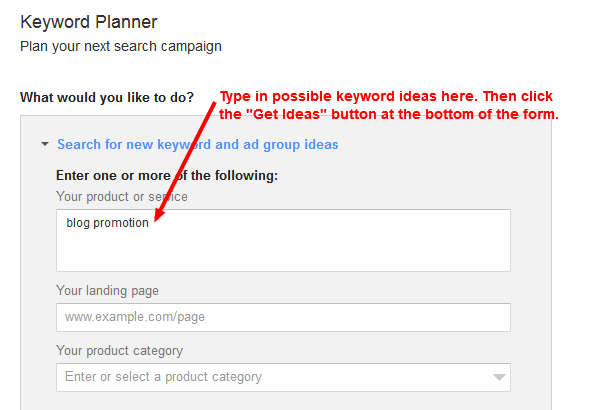
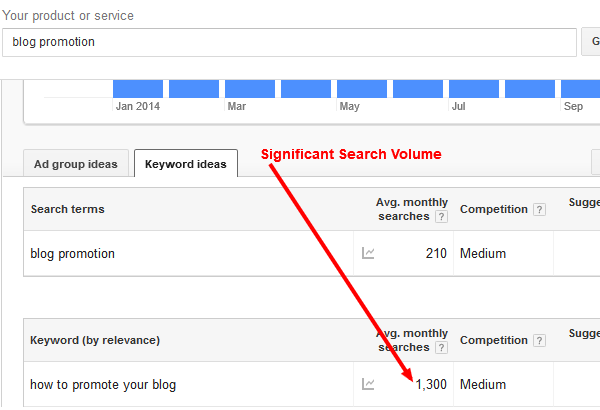
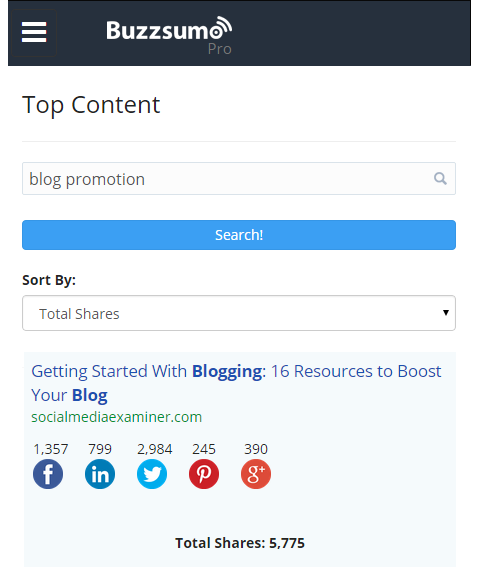
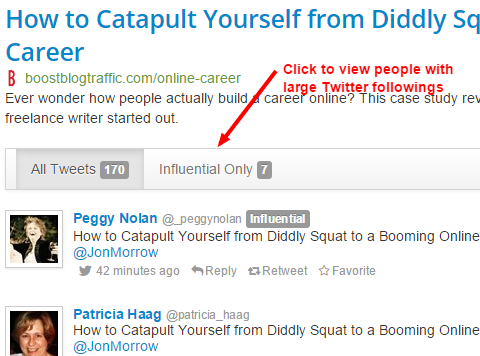
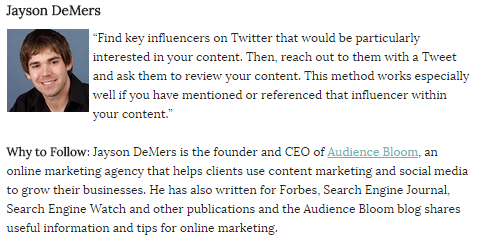
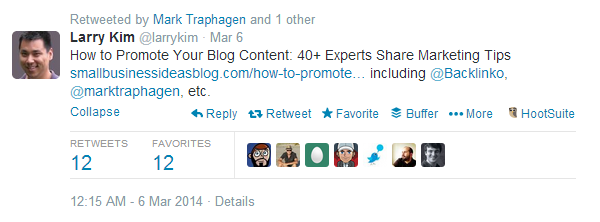
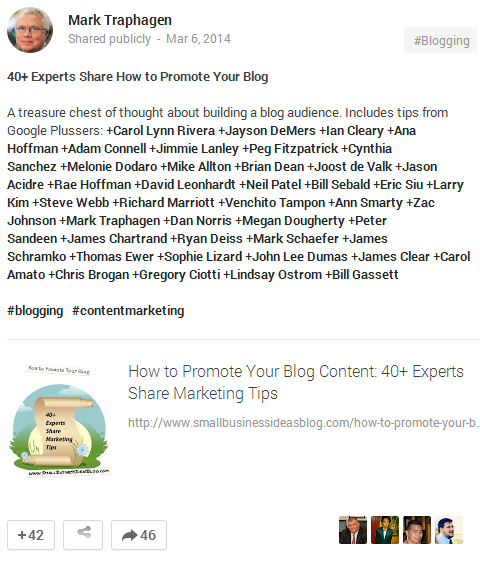
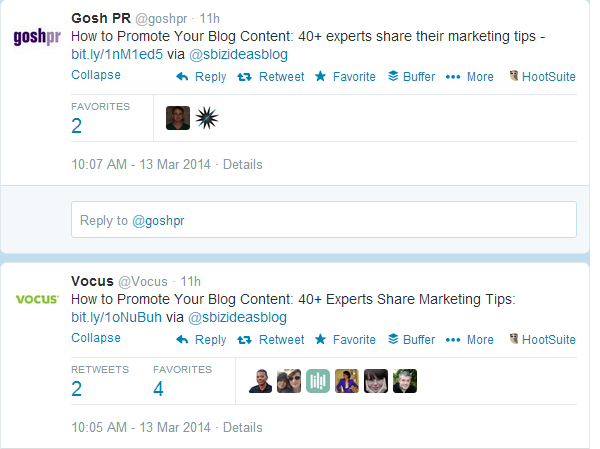




Hey Brian,
Excellent post and outline here.
I’ve only done two expert roundups ever and both of them has been very good. I made a decision this year to do more of them. But I have a question. How much is too much? How often should a person be going to roundup posts? Once a month? Maybe every two months?
In making the decision to do more roundup posts this year, I’ve taken a different approach and started really researching questions that people have and making a list of them that I could ask certain experts.
I’m doing this because like you said, if the expert has seen the same type of question over and over again, they’re more likely not to reply back or participate. But I like the tip about Linkedin. I’ll have to try that.
I love your negative approach to the question. That’s something I need to do and it seems like it would work very well.
I agree with your point that a great headline and image is what will make that post go as well. For my future posts, I have to spend some time making sure these are spot on.
Overall, great post here.
– Andrew
Thanks Andrew. I don’t know if there’s a specific quantity that would be considered too much. As long as you can create something valuable for readers, but you probably don’t want to have a blog with only expert roundups.
For me, I think I would probably do a maximum of 2-4 a year. But if you find that doing more works well for you and those posts resonate with your audience, then by all means, go for it. I know Social Media Examiner has done quite a few of them that have broken 5k social shares. Let me know how it goes.
That’s what I was thinking. Maybe 2 – 4 … or around that number.
I personally think that doing more than that may not be a good thing. It may show your audience that you can’t come up with suitable topics on your own that interest them and have to resort to doing countless round-ups.
Thanks again for this excellent post and really a resource for any round-ups I do in the future.
– Andrew
Thanks Jon and Glen for the opportunity to post on Boost Blog Traffic and work on this post. I’d also like to thank all the experts that took time to contribute quotes to this. If anyone has any questions, I’d be happy to answer them.
Brilliance distilled in a blog post. Great work!
I think another great way to get experts to say YES to your blog post is by commenting on *their* blogs. This works for the medium-tier bloggers – they may get 1-2 dozen comments, but don’t have a huge comment following. You may be surprised how many bloggers read and value every single comment they get, and by showing that interest through the comments section you immediately identify as someone who has already added value to their business, making them much more likely to say YES to your request!
Yes, Daryl. That’s a great point – building relationships with people beforehand definitely helps. And blog commenting is one of the best ways for bloggers to do that.
Great post, Brian! I just did a round up post on Pinterest tips and had 31 bloggers participate.
I always have problems lining up the multiple head shots and text and found a great free plug-in called Spacer. It really helped to make the post look good.
Thanks!
Sue
Thanks Sue! I think I saw one you did about blogging not too long ago also. Thanks for the tip about the plugin, I’ll have to take a look at that.
Hi Brian
I just missed the ship, kind of. My new expert roundup post came 2 days back. Only if your post was published a bit sooner.
But I can still do the promotion stuff. Thanks for the tips. My post has around 150 shares by now. I am sure it will increase though. 🙂
Neil
Thanks Neil. I’ve noticed that there are a lot of little things that can really help make roundups more successful that bloggers often miss. Let me know how it goes!
Another great post
My question is which way I choose- one ultimate Guide per weak or 7 posts per weak on one topic.
help please
Hi Lovepreet. I think it would be hard to do one ultimate guide per week or a daily blog post and still have time to promote it. I believe Boost Blog Traffic started with just one post a month when they launched, but focused on quality and promotion.
Wao, this is a kind of lengthy post so far with every paragraph worth reading .
Google is really doing great jobs for you guys . maybe I couldn’t have been here .
Honestly I love all mentioned #Tips and I’ve grab enough for the day though I’ll bookmark this post for future reference .
I’m in a kind of hurry now but when returns , I’ll surely drop a note for you brain.
Thanks brain Sir , for dishing out this quality guide for free to we readers and not making it a Premium EBook which could’ve cost much money .
I’m glad to be at your arena . . Bye for now
Welcome John, I’m glad you liked it. Glen and I worked on it for months and it is pretty long, but I think we created something useful for bloggers that want to really get the best results from this type of blog post.
Hi Brian. Great post and also very timely as backlink tip 6 on Neil Patel’s most recent post on 7 proactive ways to get backlinks that actually boost your traffic was “round-up posts.”
It just confirms that you know exactly what you are talking about.
Great post. Love it and thank you.
Thanks so much, Hannah. Roundup posts do tend to get backlinks so they do also help with SEO.
This is a very helpful post Brian. Well done. I have just published a round-up earlier this week and it is already the most engaged post on my blog.
I asked 10 bloggers to list their favourite blogs about blogging. The advantage of the round up was that both contributors and the suggested blogs shared the post. A double-benefit.
Another tip that I can give is to go beyond just writing a round-up, which can sometimes become boring. In mine, I added a bonus at the end in which I linked to the guest blogging guidelines of the recommended blogs. This offered extra value to my readers, who are bloggers. It is also further contributed to making the post into a real resource for readers.
To check out the post, here it is: http://www.wplighthouse.com/top-blogs-about-blogging-roundup/
I would love to see what you make of it. And well done again!
Nice Jeffrey – great strategy! I think adding the list of places to guest post is certainly something that readers will find helpful and appreciate. Looks like you’re off to a nice start – thanks for sharing!
Very insightful and detailed narrative on how to go about putting together and publishing a strong expert round-up piece. You certainly showed in your own article how to find and engage the right experts. I read many/most of their blogs. Nice job!
Thanks for the compliments, Neil! It was a lot of work, but I liked how it turned out.
Hi Brian,
I have to say, this is definitely the most valuable post I have seen lately! Excellent tips, thank you for sharing and doing all the hard work by putting it all together.
I’m a brand new blogger, and I have thought about an expert round up post as well. You got me inspired! 🙂 Thanks again, and looking forward to reading new posts as well 🙂
Thanks,
Reelika
Thanks Reelika! Feel free to let me know how it goes – I always love a good success story.
What an amazing, educational post!
Having not blogged for a year and never having succeeded to draw many readers, I feel I just received the greatest gift. Thank you, Brian! Thank you Jon!
You gave me the idea to do an expert roundup shortly before my non-fiction wellness, inspirational book comes out. As soon as my manuscript goes to the editors, i will begin working on this project and hope that using your insightful and detailed guidance and information to build my readership so as to enrich the lives of others.
Blessings and light!
Thanks Katina! Roundups are a lot of work, but are a great collaboration. Best of luck with your book launch also!
Thank you Brian! For everything! I will sure give it my best. If it’s meant to be, it will be. I saved everything and need to go over it a couple of times…at the least. Lots of work, indeed!
Wow! Super-thorough guidebook here for creating roundup posts.
As someone who gets asked a lot to participate in these, I can say that I usually turn them down because they want me to answer 10 complex questions via email, or their one question is either very generic (we’ve heard it 100 times before), or not relevant to what I do.
Bloggers need to realize that at this point, everyone is trying the roundup-post strategy to get traffic — so you need to come up with a truly exciting concept, both to attract experts, and to get readers.
I love your tip to get some more unexpected people — seems like most roundups I find have the same 20 experts featured. There are so many great minds online. Tap some new ones, or at least new to your audience.
Thanks Carol! I definitely wanted to present the busy influencer’s viewpoint as well. I hope this will help bloggers try to create a win-win for all parties and put more thought into their roundups. A good roundup definitely involves more than just slapping a question together and inviting every popular bloggers that they can find.
I love your blog, by the way and how you encourage freelancers to realize what they’re worth and avoid low paying work. Keep up the good work!
Excellent post. Thorough, organized, demonstrative, engaging, and inspiring.
Thanks Dennis – I’m glad you found it useful!
Thanks for asking me to participate Brian — this post really turned out great!!!
Welcome Steve and glad you could contribute. The post was a lot of work for sure, and I’m happy that I got to include some expert perspectives in it.
Hi Brian
You did wonder and I would say seventh wonder of the world by creating this post. From researching, planning, creating, crafting, publishing, promoting and sharing to followup stages you discussed every point in deep details.
Finding the hot topics and most asked queries is a heck of the task. One can’t do it exactly because people have different types of concerns and worries and we can’t create the comprehenisve one covering all their problems. Yes we can try our best to find the one that is most common and hot in the market.
With warmest regards and highest appreciation to all your points I would just add one point here that while doing this lengthy exercise a blogger should send four questions on different topics to create four expert roundup posts instead of one and publish them one by one after a little gap. Otherwise he will have to do the same lengthy and cumbersome exercise once again for creating another roundup in future.
Thanks a lot for sharing this wonderful post of huge value.
Hi Mi Muba. Thanks for your comments. Creating the post was a lot of hard work and a lot of thought went into it, so I’m glad you found it useful and thanks for the compliments.
Several experts mentioned that they don’t like the long list of questions. While it might save the blogger some time in the long run, it can be too much work for a busy influencer. See Carol Tice’s comment above also.
So I would take some caution with that approach. I guess it depends on who you are asking, how busy they are and how well you know them.
Incredible post… this took a lot of effort, and it’s well worth it for the reader. I’m off to do my expert roundup post now… you’ve inspired me… thanks, Brandon.
Thanks Brandon! Let me know how it goes!
Hi Brian
Thank you for all these tips. It’s definitely something I have to implement in my content creation to get more movement for my blog.
Thanks Bruno – happy to share! I look forward to seeing your expert roundup
Hey Brian,
This was a great, valuable extensive blog post about doing expert round ups post. To be honest with you, I’ve never done one, but after reading this it doesn’t sound like a bad idea to do one.
I find a lot of bloggers talk about Buzzsumo and this is a tool I have yet to try out. I use keyword planner as well as headline analyzers, but if the topic isn’t popular then what would be the use of these two tools.
Asking expert bloggers to do a round up can be quite intimidating at first, but if we want to get anywhere with out blog, then we have to get over it. Especially if we’re going to deliver value that our own target market and subscriber list would be interested in. This is another way in going all out for them.
You have came up with so many different tips here on this post that I will definitely have to come back to this post when I plan on doing a expert roundup post! Thanks for sharing and I will be bookmarking this post!
Have a good one!
Thanks Sherman! Buzzsumo is definitely a useful tool. Outreach can be a little scary if you haven’t done it before, but I’ve found that influencers can be really nice and I’m glad that I reached out and connected to some of them. Thanks for your comments and let me know how it works out for you.
Great post Brian and I liked how you backed up your advice by actually doing it through out the post.
Could you tell me how long it typically takes to do all of this?
Hi Bryan. I think the one I did took at least two weeks. It actually can be more work than a typical blog post due to collaborating with others, additional promotion and organizing everything.
Some excellent points and strategy here, Brian. I enjoyed your writing style.
I think it’s also important to say that you’ll have a much better chance of your round-up posts getting shared and linked to by influencers if you’ve taken time to create and nurture a friendship with them online first. I’ve learnt that most of them are bored of most requests for links they get in their Inbox. I included an interesting quote from Corbett Barr about this in this post: http://firepolemarketing.com/online-networking/.
Corbett’s comment taught me a lot about doing the groundwork in making friends online and giving influencers a reason to share. This involves thinking creatively about how you reach out to each influencer from the beginning and keep up the friendships. Marrisa Murgatroyd’s cartoon caricatures of influencers she has on her SuperPower Summit series is a great example of being creative about how you can stand out from the boring crowd and give influencers that vital reason to engage with you.
Hi Tom. That’s a great point and that’s what my opt-in bonus is about. I’ve found that many influencers themselves are good at building relationships with others, despite getting tons more email.
As far as roundup requests, some like them, some don’t and some are selective about which ones they participate in. It can depend on the person and how they are approached.
Brian this is epic!
What a well written and well put together resource – the layout and images here make this very easy to follow.
I’ve had great success with expert roundup style posts, and my process is similar to the one you outline here – but laying it all out like this makes for a fantastic learning resource. Great idea to have the various experts commenting on each stage of the process.
I’ve shared this across all my social media channels so thanks again for putting this together.
Cheers!
Loz
Thanks Loz – I’m glad you found it useful! Roundups are great because it’s a collaboration that doesn’t take up too much of time on the influencer’s part. I was happy to get such a high level of participation from the experts on this post.
This is awesome, thank you! I’m relaunching my website next Monday (9th Feb) and have been preparing two round-up posts for the launch. I’ve so far reached out to 43 people, had responses from about 30 and have written answers for the post from 22 – so about a 50% success rate. Some were people I was already connected with, but most were cold. What surprised me was that it was the bigger, most established people I mostly had positive responses from. So I’m wondering a couple of things about that. Is part of the reason they are bigger/more established/more successful because they are still willing to serve everyone when they can? Or is it also easier for those people to reply because they have teams/support systems in place to help with their email? It’s been an interesting and very uplifting experience though connecting with lots of new people and I’ll be doing my best to cultivate those relationships going forward.
So this article is perfectly timed so that I can do the maximum possible with the posts on launch day. Thank you, Brian, for a such a thorough and detailed post.
With love,
Leah
Hi Leah – that’s a great question and I think that it can be both. One thing I noticed about many influencers is that they’re better than most people when it comes to building relationships and that’s likely one of the factors that allowed them to become influential in the first place. I’ve found interestingly enough that overall, bloggers that are less well known are less likely to reply to an outreach.
Also, some bloggers do have other people to help them manage things, so that does allow them to focus some of their time on networking, emailing and building relationships with others.
A 50% response rate is pretty good – I think mine was around the same for my first roundup. Good luck with your blog relaunch and let me know how it goes.
Hey Brian,
I love the guide, and the approach to expert roundups
What mailing list providers do you recommend?
Thanks Codrut. Most bloggers use AWeber or Mailchimp when they start out. Mailchimp is free for up to 2,000 subscribers, so that’s who I usually recommend.
Hi Brian,
Thanks for this informative post! It was an easy read, and I liked how you slotted in the experts 🙂
Thanks Serene. It was a lot of work and I liked that the experts added some great tips. Glad you enjoyed it.
Hi Brian,
I’m surpised you didn’t package this as a PDF and put it up on Warrior at $7. It would have sold a bundle! However, I’m grateful you haven’t and you’re letting us share of this wisdom.
A hell of a lot of information here and all of it superbly valuable. If we can do half of it, we’ll be doing very well indeed. Many thanks.
Regards,
Steven Lucas
Welcome, Steven. I definitely could have been an ebook and I’m glad you found it useful.
Hi Brian.
I’ve been thinking of creating an expert round up article and this post really helps. Thanks!
Welcome, Sania! Let me know how it goes.
Brian, I had a lot of success using a similar approach for one of my guest posts: I asked if I could use their headshot in a specially created image… of a shark!
8 Action Tips For Guppy-Bloggers In An Ocean Of Sharks… was a hit as a result. 🙂
So sometimes you don’t even have to get the experts to answer a question, all you have to do is reach out to them in a unique way. 🙂
Hi Lorraine. I really liked the creativity in your approach. Being creative and different in the approach is what will make it fun for the experts and increase the chances that they’ll want to contribute. Great job!
We’ve never done this but it’s something that looks like it’s worth the time, despite the heavy workload involved. This is a post worth its weight in gold. (or maybe its shares in gold? You get the picture!) Bookmarked. Love the content you guys post here. I always learn something 🙂
Thanks, it’s definitely something everyone should try at least once. Looking forward to seeing your first roundup post.
Thanks for this informative post. It was an easy read, Thanks for sharing.
Welcome, glad I could help! Thanks for stopping by.
Very nice article as always. Liked it very much. the insights are very Good the explanation about Linkedin groups are very good
Thanks Anirudh, glad you found it useful!
Brian, thanks a lot for this post – it has literally come at the perfect time for me!
I have just launched my new blog with an expert roundup as the first post! I have to say, I did all the reaching out before this post went live so wish I had a bit more structure in my questioning- your model is a much more efficient way of doing things!
Nevertheless, I had a great response and found that even though Cub Marketing is a brand new blog, influencers in the internet marketing industry (my niche) are actually really helpful and happy to give their two cents!
I used your comment about tagging everyone in G+ – even though I’m not very active there I think this is a nifty tip!
Keep it up Brian.
Best
The Cub
Thanks Cub! I’m glad you found this guide to be useful and I’m looking forward to seeing your future roundups! Best of luck with your new blog.
Loved the article Brian,
It’s so amazing how you have gotten snippets from various bloggers and experts, each one of them touched on a crucial topic.
Brian Dean’s point really resonated with me, The questions people ask really need to be easy, that not only helps the interview go great but also helps with generating flow in the interview.
After all we humans are more likely to answer specific questions than vague ones. That sort of response is hard wired in us.
Thanks Saad. Making it easy certainly does help when it comes to emailing busy bloggers. Glad you found the post useful!
Hi,
Wow, Great article. I loved you described all things in very good manner.I really like Ingredient points, check and test points like as Ingredient #2: The Right Experts.All points are very helpful for all people.I love to see some other post from your site.
Thanks to share this post with us:)
Regards,
Varsha Singh
Hi Varsha – thanks so much! Picking the right experts certainly is a useful activity that bloggers should spend some time on. I’m glad you found the post useful.
By the end of 2015, the Panama Canal will have undergone its largest expansion to date. In what is undoubtedly good news for Maryland’s maritime economics, when the first big ships make their way through the canal, the Port of Baltimore is one of two ports on the East coast currently able to accommodate the mega ships.
Thanks for the post publishing Brian. Well i desire to get as much shares as possible on my blog posts but for that it really needs to take care of few things that you have share in your awesome blog
Thanks Nitin – I’m glad that it was useful to you. Looking forward to seeing your next roundup post!
Hello Brian,
So unique.I like all point in your post and your articles are so easy to understand because it is written in so easy language and it really helpful for me.
Thanks for this wonderful post, I will pass it:)
Have a nice day!
Thanks Neha, I appreciate your support and I’m glad you liked the post!
Hi Brian,
That was an educative piece.I enjoyed reading. Your facts are right on track. Thanks for sharing this with us. I would love to share this article with my followers at Facebook, Google+ and Twitter.
Regards,
Pooja Singh
Thanks Pooja, by all means feel free to share it. I appreciate your support!
Wow, Great post.I am very happy to visit this website and read the great information that you present. Thank you
Thanks Komal, I’m glad you liked it!
Very nice round up Brian. I’ve been in my share of roundups and for someone like me at this point, where im still building online authority, it’s usually being at the right place at a right time to get included.
I’ve only done one expert roundup in the past so I definitely have to try it out more. Great guide Brian!
Thanks Dennis – let me know how it goes! Looking forward to seeing your next roundup.
I totally agree with the guest writing percentage but you have to earn the credit to be a guest author on a popular blog.
Wow, honestly I have never thought that a blogger can get so many social shares and so many exclusive genuine comments to an article but reading your guide to getting visitors engaged in our content really give me hope! I will definitely try out these tips!
Thanks Vanessa – It was great being able to get 1000’s of social shares when I was just starting out. I’m glad you liked the guide and let me know how it goes! I always enjoy a good success story
Brian, this is an amazing article. Thank you so much. I book marked it!
Welcome, Sandy – I’m glad you liked it!
This was really very informative article Brian. I never done any roundups yet so your insights would definitely help me in my next post. Thanks for sharing publicly. Would like hear from you what are your views on experts link roundup posts i.e., curating or sharing experts posts which are already on the web e.g., many times http://www.smashingmagazine.com shares such type of posts.
I’ve seen those before and sometimes those work well, if created properly and promoted properly. There’s less “buy-in” from the experts though on that type of post.
Thanks for the info!
By the way, recently learned that not only am I learning from your posts, but some of my subordinates in the company’s Global Advertising. Thank you for the advice, always write the case and turn!
I am a big fan of Brian Dean’s ideas, so I usually visit his page to find news regarding new SEO strategies.
Neil Patel is also an expert here, so I follow his ideas from time to time.
I think it’s a good idea to ask your experts slightly different questions, as if you ask them all the same question the article won’t read very well. I also think that asking for no more than 100 words means you have a much greater chance of getting a reply. If you approach 20 experts for 100 words, you’ll likely end up with at least 1000 words of content.